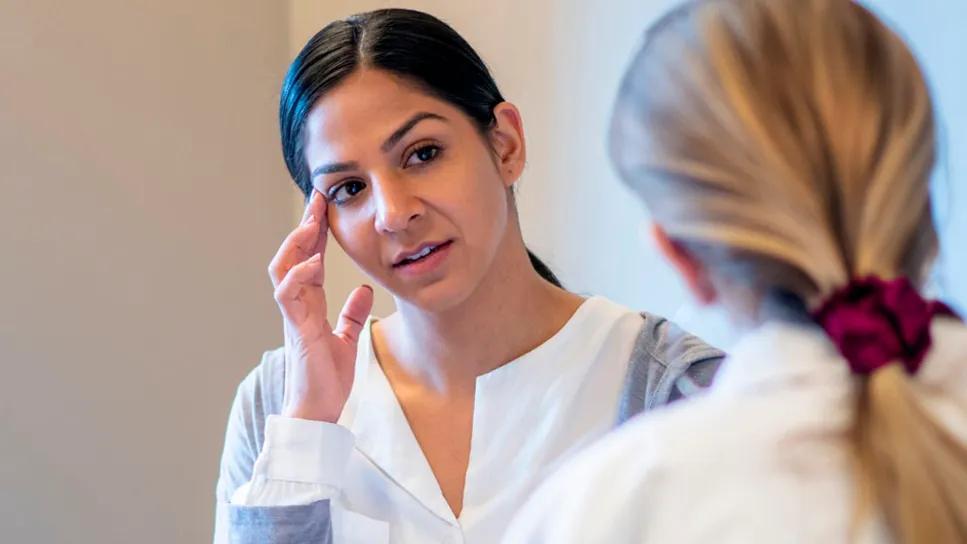Helping patients and physicians

Cancer and cancer treatments impact the sexual health of virtually all women in one way or another. Yet this is a topic often not broached by physicians during or after treatment. "Sexual well-being affects so many systems when you're going through a diagnosis, treatment and recovery," says Theresa Callard-Moore, PhD, LSW, a psychotherapist at Cleveland Clinic. "Emotionally and physically, the cancer experience has an impact on sexual health."
Advertisement
Cleveland Clinic is a non-profit academic medical center. Advertising on our site helps support our mission. We do not endorse non-Cleveland Clinic products or services. Policy
Physicians may be hesitant to bring up these issues, due to time constraints and/or lack of knowledge of how to help. "When a patient is diagnosed, their physician is focused on medical intervention of the disease, which is exactly what we want them to do,” explains Dr. Callard-Moore. “But asking the patient at some point in their journey if they have any sexual health concerns they’d like to discuss is important. Early on, the patient might not be focused on this issue, but down the road during treatment and recovery, they may be struggling with sexual intimacy and not know where to turn."
One of Dr. Callard-Moore's goals is to help physicians to be able to talk about this. She meets with physicians across Cleveland Clinic and teaches what's called the PLISSIT model.

Image content: This image is available to view online.
View image online (https://assets.clevelandclinic.org/transform/5d8b5ccb-3a56-4b13-b705-d3168f2f5594/sexual-health-issues-and-cancer-chart)
The sexual health issues women with cancer face are very individual, but common ones include pain from surgery or treatment as well as lack of desire due to anxiety or physical issues such as fatigue, nausea or vomiting. "The number one issue patients talk about is body image," explains Dr. Callard-Moore. "Their body is changing in some way, whether it's losing a breast due to mastectomy, having radiation to the vulva or dealing with a colostomy bag. These things interrupt someone's feeling of comfort. And in order to feel pleasure, we need to feel comfortable and relaxed. All of those issues can interrupt sexual health. But there are ways through that, with the help of sexual health professionals, psychologists, physicians and other supports."
Advertisement
There are many layers to what women with cancer experience in regard to sex and sexual intimacy. If, for example, a woman is experiencing pelvic pain, this understandably leads to muscle tension. This leads to low desire. Now the patient is contending with painful intercourse, muscle dysfunction and low libido. "Female sexuality is inherently related to how we're feeling emotionally,” says Dr. Callard-Moore. “Do I feel physically safe? Am I feeling emotionally close to my partner? Am I relaxed? All those aspects need to be in play to feel pleasure.”
Sexual health is a part of overall health. If a patient is facing challenges with their sexual health, this could be an indicator that there is a health issue, or something is out of balance. “Physicians don't need to know all the answers, but being willing to talk about it and bridge the sexual knowledge gap benefits patients. This may simply involve referring the patient to a licensed mental health therapist who specializes in sexual health. With these professionals, there is no physical touching involved. They meet with the patient, and very often their partner, to talk through the emotional aspects of sex and intimacy issues.”
Licensed mental health therapists can be found through the American Association of Sex Educators, Counselors and Therapists or at Psychology Today.
Hear our recent podcast about sexual health support for patients with cancer.
Advertisement
Advertisement

Sexual disorders affect patients across all cancer types

Genetic variants exist irrespective of family history or other contributing factors

Percutaneous stabilization can increase mobility without disrupting cancer treatment

New guidelines update recommendations

Simple score uses clinical factors to identify patients who might benefit from earlier screening

Use of GLP-1s and improving cardiovascular health lowers risk of hematologic malignancies

Largest study of its kind identifies three treatment exposures that contribute to risk

Slower drug elimination from the body among females may impact safety and efficacy